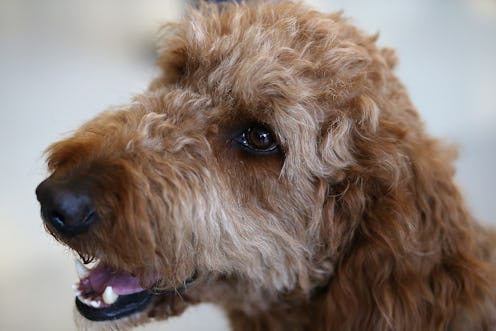Life

All dogs are good dogs, but therapy dogs are in a class of their own. What makes a good therapy dog? It's a lot more than an adorable begging face or a wiggly butt. According to experts, it takes a very special pup to be the right fit for a job supporting humans. From the ability to stay calm in the midst of chaos to the intelligence to be able to learn a number of commands and obey them every time, these canines need a pretty incredible set of characteristics to really shine.
But that doesn't mean that they need any less care than a non-working dog. While a therapy dog is one that works hard to take care of and support humans, it's important to remember that they're also sweet pups who need plenty of love and playtime. "Even the most even-keeled, equanimous dogs need frequent breaks and timeouts to decompress from all the attention, petting, stimuli, etc.," Russell Hartstein, CDBC, CPDT-KA, a certified professional dog trainer and founder of Fun Paw Care, tells Bustle. They certainly love treats and long walks just as much as the next dog.
Here are some of the characteristics of a great therapy dog, according to experts.
1
They're Able To Ignore Stimuli
"Therapy dogs are first and foremost extremely well behaved around all stimuli," Hartstein says. Since they have to travel to all kinds of places with their humans, they need to be able to focus on working without getting sidetracked by a squirrel on the sidewalk or by another dog's attempts to play. Staying in work-mode is crucial to doing a good job.
2
They're Able To Get Along With Others
In addition to not having any behavioral issues, it's important that a therapy dog not have issues getting along with some people they may have to interact with. "They also like and tolerate all dogs and people," Hartstein says. If a therapy pup was very anxious around small children, for example, that might keep them from being able to focus.
3
They're Balanced
While friendliness is a great quality in a therapy dog, finding a good balance between loving people and disliking them is key, Hartstein says. While they shouldn't be averse to people or other pups, they shouldn't be too friendly, because this might tempt them to start playing or interacting when they aren't supposed to.
4
They're Eager To Please
A great therapy dog should be eager to please their owner and listen to their commands. "Therapy dogs need to be able to listen to their owner or handler at all times," Erin Askeland, CBCC-KA, CPDT-KA, animal health and behavior consultant at Camp Bow Wow, tells Bustle, "but shouldn’t be so attached that they won’t be happy to accept attention from strangers." A healthy balance of the two is ideal.
5
They're Calm
"Therapy dogs must be calm and cannot jump all over new people," Askeland says. "They also can’t be mouthy or unable to lay down for a period of time." A dog with lots of energy might seem totally normal, but in a situation where the pup is working and not just playing, it's crucial that they can stay in control. "A calm demeanor will help those in need also become calm," Akeland says.
6
They're Adaptable
It can be hard for any dog to adjust to a new routine or to interacting with new people, but a great therapy pup will adjust quickly and easily. "Therapy dogs will experience new situations and people on a regular basis," Askeland says, "so they must be adaptable to these new scenarios and not scared or anxious."
7
They're Intelligent
In addition to characteristics like adaptability, friendliness, and obedience, the best therapy dogs will be very intelligent. "A therapy dog will need to undergo quite a bit of training to qualify and be able to support those in need," Askeland says. "This will include obedience training, socialization, practice visits, meeting strangers and other dogs, and experiencing odd objects and settings," she says. "That’s why a therapy dog needs to be intelligent so that they can learn how to cope with all of these elements in a safe, healthy way."
8
They Like To Be Touched
"Just like some people, some dogs may not like being touched," Dr. Lauren Abolafia, DVM, CVA, tells Bustle. "This does not mean they are a mean dog, but some parts of their bodies may be triggers." Some super sweet pups don't like to have their paws touched, for example, because they're scared of having their toenails clipped. "They could be the kindest dog and one small touch of the paw could trigger fear and sometimes aggression," she says. "Therapy dogs encounter a lot of people so you want to ensure the dog is receptive to all kinds of contact.”
9
They're Gentle
While it's important that a therapy dog be gentle with anyone they're working with, it's especially important that they be able to be gentle with young children or the elderly, who they might come into contact with regularly. "A dog may not know its own strength, so a playful nip or bump can become dangerous for a small child or elder person," Dr. Abolafia says. "A dog that can pull back its own strength and remain gentle at all times is a must."
Next time you see a dog wearing a therapy vest, give them an extra big smile because they're an extra special pup. After all, there's nothing like a dog who cares for people.
This article was originally published on